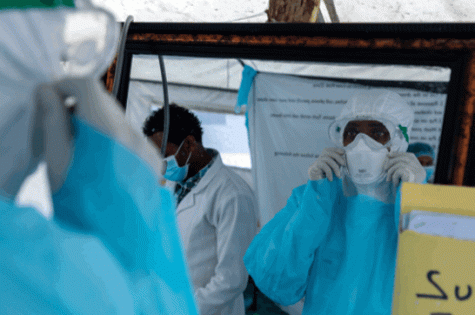Health Care Workers Battle Not Just the Virus but Also Mental Health
New studies show health care workers feel like they are in war

Health care workers are putting on all of their equipment to interact with patients that have Covid-19. (Mulugeta Ayene, Flickr.com)
Covid-19 has not only struck the world with a deadly virus but also an outbreak of mental illness. Medical workers have it the worst. Working on the front lines feels like war.
This virus has not been easy for anyone, especially health care workers. Their around the clock work drains them emotionally and physically.
Allan Detsky, a writer for Time Magazine says, “The risks physicians, nurses, and other health care workers face, by reusing masks and gowns, resemble the risks soldiers faced over 15 years ago when patrolling Iraq in un armored vehicles. A shortage of personal protective personnel equipment (PPE) is one of the defining characteristics of the COVID-19 pandemic, a crisis many compare to a war.”
Medical professionals are running towards a fight that has the intensity of a war. Allan Detsky explains the nurses and doctors as heroes because they are not obligated to work in a pandemic. These health care professionals that are fighting and doing extensive work outside of their normal duties.
“If our society can’t provide health care workers with adequate protective equipment, we can at least provide their experience with its own framework and not simply analogize it to being a soldier in a war,” explains Allan Detsky.
Depression rates have skyrocketed in doctors and nurses treating coronavirus patients. A new study from the University of Utah Health scientists showed that over half of doctors, nurses, and emergency responders involved in COVID-19 could be at risk for one or more mental health problems like traumatic stress, depression, anxiety, problematic alcohol use, and insomnia.
Doug Dollemore, a science writer at the University of Utah says, “The researchers found that the risk of these mental health conditions was comparable to rates observed during natural disasters, such as 9/11 and Hurricane Katrina.”
The coronavirus however offers us an opportunity to better understand the extraordinary mental health and strains that health care providers have to deal with on the daily. Doug Dollemore explains that we can take these challenges and find better coping skills in the future. He explains that all the research he has done he hopes to build a better understanding of what is truly going on and how we can improve the mental health of doctors in these stressful situations.
“We all wonder the same things as to when this virus is finally going to end.” Allan Detsky says.
Vaccines do provide some hope as many health care workers are receiving the second dose and achieving immunity.
“Like all wars, COVID-19 will eventually end. The physicians, nurses and others employed in hospitals will return home,” Allan Detsky said. “For some, that will mean being reunited with the families they’ve had to remain distant from; for others, it will mean a return to practicing medicine outside of a crisis.”
